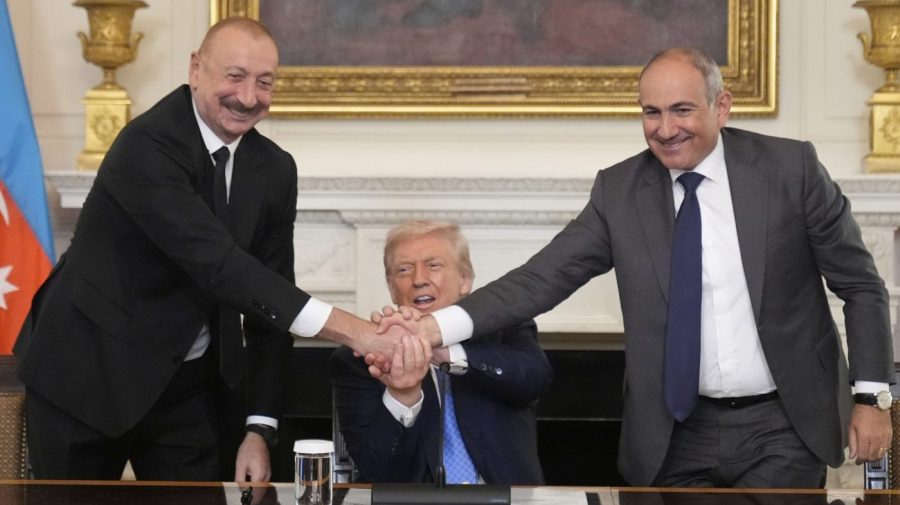World
Iran Faces Strategic Setback in Trump’s Azerbaijan-Armenia Deal

The recent peace agreement between Azerbaijan and Armenia, brokered by former U.S. President Donald Trump, has significantly altered the geopolitical landscape of the South Caucasus. This deal, finalized in November 2020, effectively diminishes Iran‘s long-standing strategic advantage in the region by undermining its influence over critical transit routes.
Historically, Iran has leveraged its geographical position to maintain control over regional transport corridors that connect Europe and Asia. The establishment of a corridor that links Azerbaijan to Turkey now poses a direct challenge to Iran’s dominance. This shift could lead to a significant reduction in Iran’s regional influence, raising concerns about its ability to protect its interests in the area.
The newly created route facilitates a direct connection for Azerbaijan, enabling it to transport goods and energy resources without relying on Iranian territory. This development is particularly impactful given that Azerbaijan is rich in oil and natural gas, making it a valuable player in energy markets. As a result, Iran’s role as a transit hub is increasingly at risk, potentially diminishing its economic and political leverage.
Geopolitically, this corridor opens up opportunities for Azerbaijan and Turkey to strengthen their partnership while isolating Iran. The implications of the deal extend beyond economics, as it also affects regional security dynamics. Iran could find itself increasingly marginalized if it does not adapt to this changing landscape.
Iranian officials have expressed concern over the potential for increased Azerbaijani influence, particularly in the northern regions of Iran, where a significant population of ethnic Azerbaijanis resides. The deal has prompted warnings from Iranian leaders about the possibility of heightened tensions along the border, as they perceive a threat to their national security.
In recent statements, Iranian officials have called for a reassessment of their foreign policy regarding the South Caucasus. The government aims to strengthen ties with neighboring countries and bolster its presence in regional affairs. This strategic pivot reflects Iran’s recognition of the need to counterbalance the impact of the Azerbaijan-Armenia peace deal.
Analysts believe that Iran’s response will be critical in determining its future role in the region. As Azerbaijan strengthens its economic ties with Turkey and other partners, Iran may need to explore new alliances and strategies to protect its interests.
The full impact of this deal on Iran’s regional standing will unfold over time, but it is clear that the nation faces a critical juncture. The erosion of its geographical advantage could lead to significant shifts in both its domestic and foreign policy strategies, affecting not only its economy but also its security posture in an increasingly competitive environment.
As this situation unfolds, the dynamics in the South Caucasus will continue to be closely monitored by international observers, particularly given the potential for further developments that could reshape the region’s geopolitical landscape.
-

 Lifestyle3 months ago
Lifestyle3 months agoLibraries Challenge Rising E-Book Costs Amid Growing Demand
-

 Sports3 months ago
Sports3 months agoTyreek Hill Responds to Tua Tagovailoa’s Comments on Team Dynamics
-

 Sports3 months ago
Sports3 months agoLiverpool Secures Agreement to Sign Young Striker Will Wright
-

 Lifestyle3 months ago
Lifestyle3 months agoSave Your Split Tomatoes: Expert Tips for Gardeners
-

 Lifestyle3 months ago
Lifestyle3 months agoPrincess Beatrice’s Daughter Athena Joins Siblings at London Parade
-

 World3 months ago
World3 months agoWinter Storms Lash New South Wales with Snow, Flood Risks
-

 Science4 months ago
Science4 months agoTrump Administration Moves to Repeal Key Climate Regulation
-

 Science2 months ago
Science2 months agoSan Francisco Hosts Unique Contest to Identify “Performative Males”
-

 Business3 months ago
Business3 months agoSoFi Technologies Shares Slip 2% Following Insider Stock Sale
-

 Science4 months ago
Science4 months agoNew Tool Reveals Link Between Horse Coat Condition and Parasites
-

 Sports3 months ago
Sports3 months agoElon Musk Sculpture Travels From Utah to Yosemite National Park
-

 Science4 months ago
Science4 months agoNew Study Confirms Humans Transported Stonehenge Bluestones









